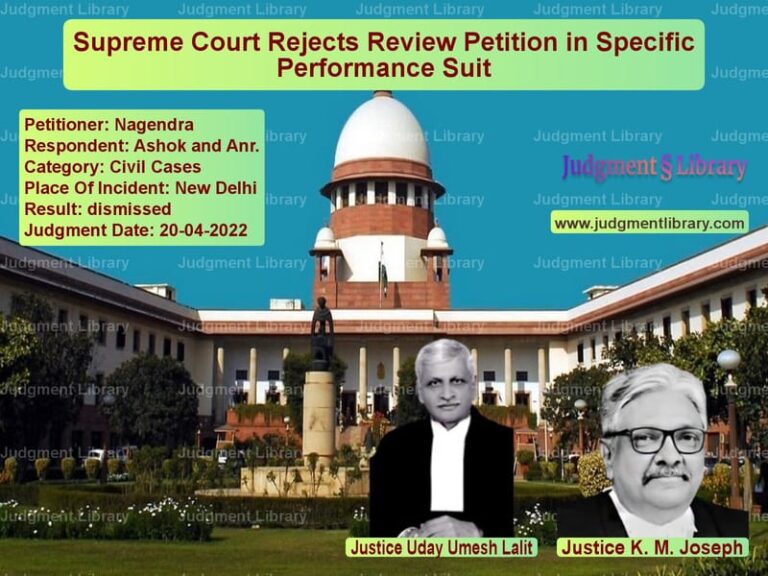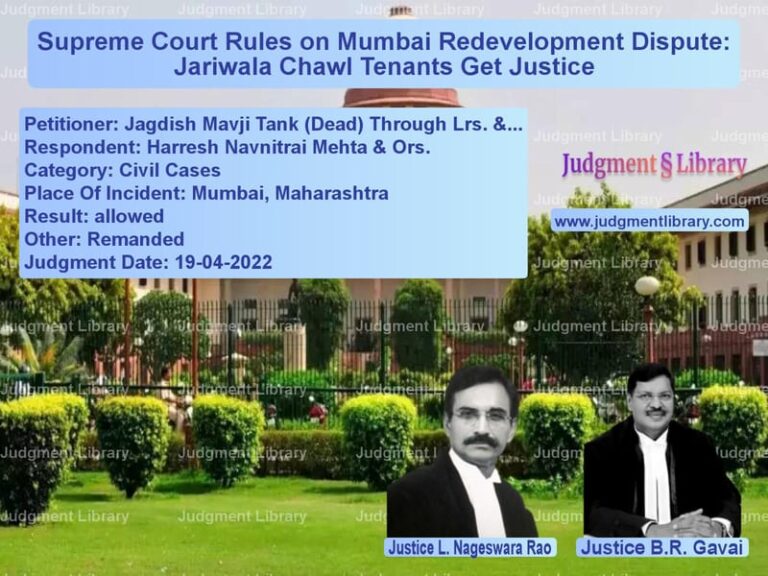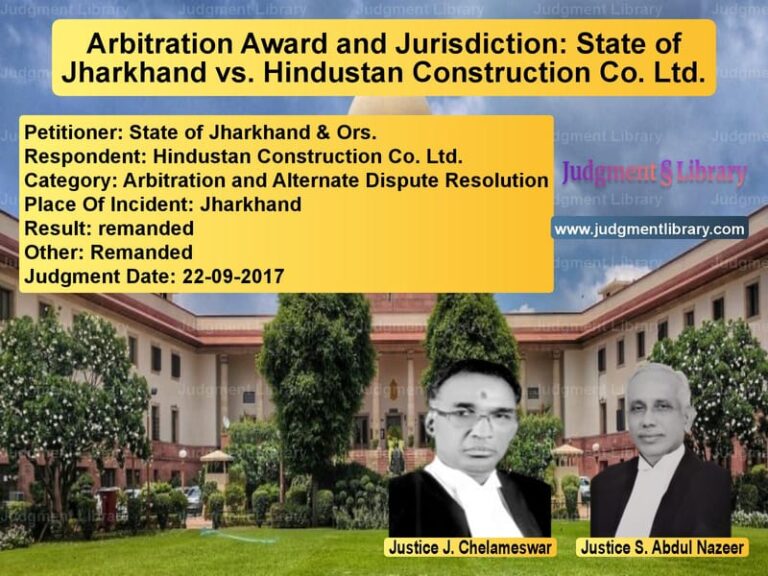Supreme Court Rules Juvenile to Be Tried as an Adult in Heinous Crime Case
The Supreme Court, in a landmark ruling on May 7, 2024, upheld the Karnataka High Court’s decision to allow the trial of a juvenile as an adult in a heinous crime case. The case, Child in Conflict with Law Through His Mother vs. The State of Karnataka and Another, involved serious allegations under the Indian Penal Code (IPC) and the Protection of Children from Sexual Offences Act (POCSO). The ruling has brought renewed attention to how juveniles accused of heinous crimes are assessed under the Juvenile Justice Act, 2015.
Background of the Case
The case emerged from an incident in Karnataka, where a juvenile, referred to as the Child in Conflict with Law (CCL), was accused of committing serious offenses, including:
- Section 376(1) IPC – Punishment for rape
- Section 342 IPC – Wrongful confinement
- Sections 4, 5, 6, 7, and 8 of the POCSO Act, 2012 – Related to sexual offenses against a minor
Following the registration of an FIR, the Juvenile Justice Board (JJB) was required to determine whether the accused should be tried as a juvenile or as an adult under the provisions of the Juvenile Justice (Care and Protection of Children) Act, 2015.
Legal Proceedings
1. Juvenile Justice Board’s Initial Decision
The JJB conducted a preliminary assessment to determine the mental and physical capacity of the accused to commit the alleged crime. The board, based on a social investigation report and psychological evaluation, ruled that the CCL should be tried as an adult. However, one member dissented from this decision, leading to further complications.
2. Challenge Before the Karnataka High Court
The accused, through his mother, challenged the JJB’s order in the Karnataka High Court, arguing that:
- The JJB had failed to conduct a fair preliminary assessment within the stipulated time frame under Section 14(3) of the Juvenile Justice Act, 2015.
- The dissenting opinion of the board member indicated that the decision was not unanimous and thus, should be reconsidered.
- The CCL was entitled to the protection granted to juveniles under the law.
The Karnataka High Court, after reviewing the case, upheld the JJB’s decision and directed that the accused be tried as an adult. The High Court ruled that the delay in completing the preliminary assessment did not invalidate the decision and that the evidence supported the JJB’s findings.
3. Appeal Before the Supreme Court
The accused then approached the Supreme Court, arguing that the High Court had erred in its judgment. The main contentions before the apex court included:
- The preliminary assessment was not completed within the mandatory period of three months, rendering the decision invalid.
- The JJB’s order was flawed due to the dissenting opinion of one of its members.
- The accused had no prior criminal record and should be given a chance at rehabilitation.
Arguments by the Petitioner (Child in Conflict with Law)
The petitioner’s counsel, senior advocates Sidharth Luthra and S. Nagamuthu, presented the following arguments:
- The Juvenile Justice Board failed to adhere to procedural fairness by not completing the assessment within the stipulated time.
- The dissenting view of one board member indicated reasonable doubt about the CCL’s ability to be tried as an adult.
- The accused had been subjected to prejudicial treatment, violating the principles of juvenile justice.
Arguments by the Respondents (State of Karnataka)
The State, represented by its legal team, countered these arguments by asserting:
- The delay in the preliminary assessment was not a valid ground to nullify the decision.
- The evidence clearly established the maturity and mental capacity of the accused to commit the offense.
- The dissenting opinion of one member did not override the majority decision of the board.
Supreme Court’s Observations
1. Time Limit Under Section 14(3) is Not Mandatory
The Court clarified that the time period of three months mentioned in Section 14(3) of the Juvenile Justice Act is directory, not mandatory. It observed:
“The prescribed time limit is to ensure expeditious proceedings, but its violation does not vitiate the decision if substantial compliance is observed.”
2. JJB’s Preliminary Assessment Was Legally Valid
The Court ruled that the JJB had followed the appropriate legal procedure in making its decision, stating:
“The preliminary assessment was conducted as per legal requirements. The presence of a dissenting view does not render the order invalid.”
3. Heinous Nature of the Offense Justifies Trial as an Adult
The Court emphasized the gravity of the allegations, noting:
“The nature of the offense, the manner of its commission, and the age of the victim all point toward the necessity of a full-fledged trial under regular criminal law.”
Key Findings and Judgment
The Supreme Court delivered the following verdict:
- The Karnataka High Court’s ruling was upheld.
- The accused will be tried as an adult in the appropriate criminal court.
- The argument that the delay in the preliminary assessment nullified the decision was rejected.
- The Supreme Court dismissed the appeal filed by the petitioner.
The Court ruled:
“The appeal is dismissed. The accused shall be tried as an adult before the competent criminal court.”
Implications of the Judgment
- Juvenile Justice Act Interpretation: The ruling establishes that procedural delays do not automatically invalidate decisions under the Act.
- Heinous Crime and Juvenile Trials: Juveniles accused of heinous crimes may be tried as adults if they exhibit maturity and understanding of their actions.
- Judicial Oversight on JJB Orders: The ruling emphasizes that High Courts and the Supreme Court will closely scrutinize JJB orders.
Conclusion
The Supreme Court’s decision in Child in Conflict with Law Through His Mother vs. The State of Karnataka and Another is a landmark ruling in juvenile justice. It clarifies the procedural requirements for trying juveniles as adults and reinforces the principle that legal technicalities should not overshadow the need for justice. The judgment will serve as a guiding precedent for courts handling similar cases in the future.
Petitioner Name: Child in Conflict with Law Through His Mother.Respondent Name: The State of Karnataka and Another.Judgment By: Justice Rajesh Bindal, Justice C.T. Ravikumar.Place Of Incident: Karnataka.Judgment Date: 07-05-2024.
Don’t miss out on the full details! Download the complete judgment in PDF format below and gain valuable insights instantly!
Download Judgment: child-in-conflict-wi-vs-the-state-of-karnata-supreme-court-of-india-judgment-dated-07-05-2024.pdf
Directly Download Judgment: Directly download this Judgment
See all petitions in Juvenile Justice
See all petitions in Bail and Anticipatory Bail
See all petitions in SC/ST Act Case
See all petitions in Judgment by Rajesh Bindal
See all petitions in Judgment by C.T. Ravikumar
See all petitions in dismissed
See all petitions in supreme court of India judgments May 2024
See all petitions in 2024 judgments
See all posts in Criminal Cases Category
See all allowed petitions in Criminal Cases Category
See all Dismissed petitions in Criminal Cases Category
See all partially allowed petitions in Criminal Cases Category







